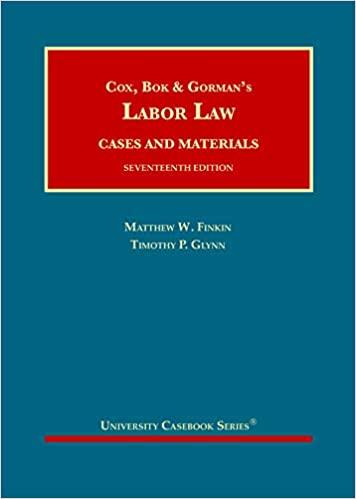Question
stion: As a rule of thumb, what assets should be used FIRST during retirement so as to minimize the tax liability for spouses/common-law partners? a)
stion:
As a rule of thumb, what assets should be used FIRST during retirement so as to minimize the tax liability for spouses/common-law partners?
a) non-registered assets of the higher income spouse or common-law partner
b) non-registered assets of the lower income spouse or common-law partner
c) registered assets of the higher income spouse or common-law partner
d) registered assets of the lower income spouse or common-law partner
Caress of Steel Inc. is a Canadian-controlled private corporation. Last year, it had after-tax income resulting from active business activities of $660,000. It paid out $300,000 to its shareholders in dividends and invested the remainder in a portfolio of investments. This year, Caress of Steel had taxable active business income of $1,200,000. As a result of its new portfolio investments, it received dividends from other taxable Canadian corporations in the amount of $20,000. Caress of Steel decided not to pay any dividends to its shareholders. Which statement is FALSE?
a) Caress of Steel can claim the small business deduction on a portion of its active business income.
b) Caress of Steel does not have to pay Part I tax on the dividend income of $20,000.
c) Caress of Steel will have to pay Part IV tax of 33 1/3% on the dividend income of $20,000.
d) The balance in Caress of Steel's RDTOH account will increase by $5,333 as a result of the dividends that it received
Under what scenario could taxes AND probate fees be avoided (assume all individuals reside in jurisdictions where probate applies)?
a) Charlie purchases a cottage with his 16-year old daughter Cindy. The property is registered to Charlie and Cindy as joint tenants with rights of survivorship.
b) Ricardo forgot to name a beneficiary on his life insurance contract. However, in his will, Ricardo indicates that the proceeds of insurance are to flow to his business partner, Hugo.
c) Tori designates her sister Carla, aged 44, as the beneficiary of her registered life annuity.
d) Amanda immediately transfers her qualified farm property to her 33-year old daughter Kelly.
Lauren is a 58-year old widow. She is concerned about the welfare of her mentally disabled son, Gavin, when she eventually dies. Lauren's daughter Felicity has indicated that she would be willing to take over care of Gavin at that point. While Lauren is comforted by this, she wants to ensure that the management of her assets once she dies is not left entirely to Felicity's discretion. How should Lauren set up her estate?
a) Through her will, Lauren should establish a testamentary trust naming Gavin as the beneficiary and Felicity as the trustee.
b) Lauren should make Felicity the direct beneficiary of her estate in her will.
c) Lauren should establish an inter vivos trust naming Gavin as the income and capital beneficiary and Felicity as the trustee.
d) Lauren should transfer her assets to Felicity and Gavin immediately.
Before his death earlier this year, Adam worked as a commissioned salesperson. At the time of his death, his company owed him commissions of $4,500 that he earned but, had not received. Adam also owned common shares in a Canadian bank that had declared dividends but, had yet to pay them out. Adam's executor, Henry, is considering filing an optional rights or things tax return for Adam. What statement is true?
a) An optional return for rights or things is only available to salaried individuals.
b) Henry must file a return for rights or things by the later of: i) one year following Adam's death and ii) 90 days after the Canada Revenue Agency mails a Notice of Assessment.
c) Henry can include the unpaid dividends on the rights or things return but, he cannot include the unpaid commission income.
d) Henry can split Adam's rights or things between his final return and his rights or things return.
Sharon and Ward have been divorced for three years. By court order, Ward must pay Sharon child support in the amount of $639 per month for their two children plus, spousal support of $400 per month. If Ward has made all of the required payments for the year, what statement regarding the tax implications of this arrangement is true?
a) Sharon must include $12,468 as part of her total income.
b) Sharon must include $7,668 as part of her total income.
c) Ward can deduct $7,668 from his total income.
d) Ward can deduct $4,800 from his total income.



Step by Step Solution
There are 3 Steps involved in it
Step: 1

Get Instant Access to Expert-Tailored Solutions
See step-by-step solutions with expert insights and AI powered tools for academic success
Step: 2

Step: 3

Ace Your Homework with AI
Get the answers you need in no time with our AI-driven, step-by-step assistance
Get Started


